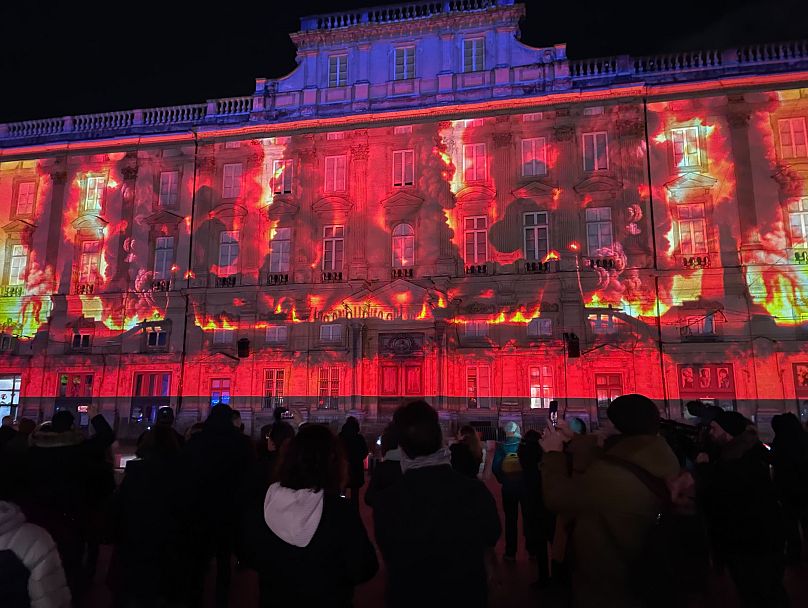In Lyon, millions of people flock to the Fête des lumières, a festival with light displays installed across the city.
Each year, millions of spectators descend on Lyon, France in early December to enjoy a city transformed by artists’ dazzling light displays.
The works of art are spread throughout multiple neighbourhoods, with many concentrated in the city centre, which is pedestrianised for the singular event.
Stands of mulled wine sellers line the streets as people stroll and queue to see the enchanting lights projected onto old buildings and in fountains and parks.
But this year it takes place against the backdrop of a complex security situation, with French and European officials warning of a “huge risk” of terror attacks during the holiday season.
French Prime Minister Elisabeth Borne raised the terror threat alert to its highest level in October following the stabbing of a teacher in northern France, and last week, a German tourist was fatally stabbed near the Eiffel Tower in Paris, in what authorities also said was a terror attack.
Local authorities in Lyon have increased the number of police officers set to secure the festival, with hundreds securing a perimeter around the city’s downtown.
“It’s an event that is taking place in a security context that is a little bit peculiar, with a high level of terror threat. As you know, we are in Vigipirate Alert Attack [the highest terror alert level] and so it will clearly incite us to be as vigilant as possible,” said Juliette Bossart Trignat, the deputy prefect for defence and security for the region surrounding Lyon.
“National police personnel will be positioned at each entry point into the perimeters. Their mission is to screen the public visually, inspect bags, [carry out security pat-downs], and, if necessary, perform identity checks.
“They will be reinforced at the exit point by the municipal police force as well as by private security agents who are mobilised and authorised for this event.”
They are supported by military members, bomb disposal experts, specialised dogs and an anti-drone brigade.
But local officials also pointed out that the event has been subject to high security since the 2015 terror attacks in Paris, with the festival cancelled that year.
“The ‘lights festival’ is the only event that systematically has an ORSEC [emergency operational plan] in place, so we are already at a maximum mobilisation level of all of our security and emergency forces,” said Lyon mayor Grégory Doucet.
Mohamed Chihi, the deputy mayor in charge of security, said that since 2016, the lights festival has continued to evolve including the “establishment of a perimeter in the city centre and filtering system.”
Far-right protest banned by local authorities
There are also concerns in Lyon about recent violent acts involving far-right protesters.
Early last month, supporters of the far-right injured people gathering at a pro-Palestinian event, police said, and weeks later roughly 100 protesters were filmed marching in the centre of Lyon with a banner stating “immigration kills”.
Local authorities have banned a planned gathering of one of these groups during an event of the Fête des lumières, with a possible penalty of six months' imprisonment and a €7500 fine in the case of any infraction.
"If there are violent acts attempted or committed on the sidelines of the event by small violent groups, we will of course intervene depending on the nature of the acts," said Nelson Bouard, the Rhône region public security director.
Far-right groups have tried to infiltrate the annual procession that takes place each year on 8 December. It reflects the Catholic origins of the festival, which falls on a religious day dedicated to the Virgin Mary.
The Catholic diocese in Lyon said in a statement that “as social tensions have increased in recent months, the diocese of Lyon wishes to make this procession a moment of peace and communion for all the city's inhabitants.”
“The diocese does not intend to take responsibility for possible disturbances caused by individuals or groups infiltrating the procession for any other reason than that of prayer,” it added, asking them not to join the gathering.
Spectators told Euronews however that they were undeterred by the security threat, planning to attend and enjoy the festival taking place across Lyon’s streets.
Lyon’s “Fête des Lumières” starts Thursday, 7 December and runs for four days.












